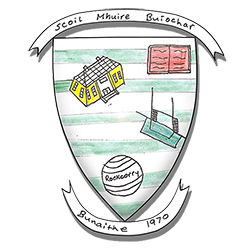Scoil Mhuire S.P.H.E (Social, Personal and Health Education) Policy:
At Scoil Mhuire we plan and teach the S.P.H.E. programme in line with the aims and objectives of the S.P.H.E. section of the Primary Curriculum as laid out in the curriculum documents. The curriculum is presented in three strands:
■Myself-—personal development of the individual child and his/her health and well-being;—contributes to children establishing ways of thinking, feeling and acting that can help to promote health and well-being both now and in the future.
■Myself and others—– developing a sense of care and respect for other people and the facility for relating to and communicating with others effectively.—-ability to solve conflicts, to empathise, to be assertive, to co-operate and to work collaboratively with others.
■Myself and the wider world—explore the community in which pupils live; develop a sense of social responsibility and appreciation of the interdependence of nature in the world; caring for the environment for future generations
These are consistent throughout the primary school and provide a basis for the SPHE and the civil, social and political education at post-primary level.
Content and Methodologies:
The curriculum is drawn up in a spiral manner. This means similar content is revisited at each level but the processes, approaches and information adopted reflect the needs of children at a particular time and at their various stages of readiness.
The plan for each level as enclosed here (SPHE Content and Methodology plan) outlines the content and various methodologies, materials and resources used in Scoil Mhuire . S.P.H.E. is allocated 30 minutes per week at each class level. The SPHE programme in Scoil Mhuire incorporates policies from a number of other school programmes e.g. Stay Safe; Relationships and Sexuality Education (RSE); Behaviour and anti-bullying policy; Healthy Eating policy.
Discretionary time is used periodically for the teaching of some sections where required e.g. Stay Safe programme; RSE workshops; etc. The teaching of the programme is enhanced at all class-levels by the integration with ICT using the classroom interactive whiteboard, CDs, DVDs, internet and classroom laptops.
The programme is taught to each class level by the class-teacher. The principal teaches the Stay Safe programme at times when the class is divided. Stay Safe is taught to 1st and 4th annually. RSE Facilitators are engaged to do day-long workshops with 6th annually with the B.O.M. providing the funding.
External speakers are used for some sections of our programme where this is of benefit e.g. nurses; dental hygienists; local Gardai; speakers for pupils’ and parents’ talks on anti-bullying; food nutritionists; parents; fire-service personnel. It is school policy that the class-teacher remains with the class during the visits of external speakers. The S.P.H.E. programme generates opportunities to form links with the local community through the external speaker system and this is encouraged where possible in order to strengthen community links and make the learning experience more meaningful.
Pupils with special needs:
All pupils in Scoil Mhuire have the opportunity to participate in and benefit from the full range of experiences offered in SPHE so that they may gain maximum benefit from the programme.
Assessment:
As the real benefits of learning SPHE may not take place until long after the pupil has left the primary school system, it poses a challenge for assessment when compared to other areas of the curriculum like Mathematics. The primary focus in Scoil Mhuire for this subject is informal assessment. The assessment tools we are using in SPHE are:
■Teacher observation
■Teacher designed tasks related to the lesson
■Teacher designed tests
■Work cards shared between home and school e.g. in Stay Safe
■Projects, both individual projects, group projects and class-projects.
■Displays and presentations of work
Communicating and recording:
Communication and recording of the child’s progress in SPHE, despite being challenging to accumulate, is of vital importance. Discussions at parent teacher meetings (both formal and informal) where the teacher and parent can form a realistic picture of the child’s overall strengths, weaknesses, challenges and development are a key element of the communication of progress. This will allow the evaluative assessments undertaken by the class-teacher during lessons to be used to develop the summative assessment which makes the overall picture of the child’s progress in SPHE. This in turn facilitates future decisions regarding learning experiences and pupils’ needs.
The SPHE policy is drawn up following consultation among staff, senior pupils, parents and management. It is reviewed and updated whenever necessary/appropriate.
Reviewed October 2019____________________________________________________________
